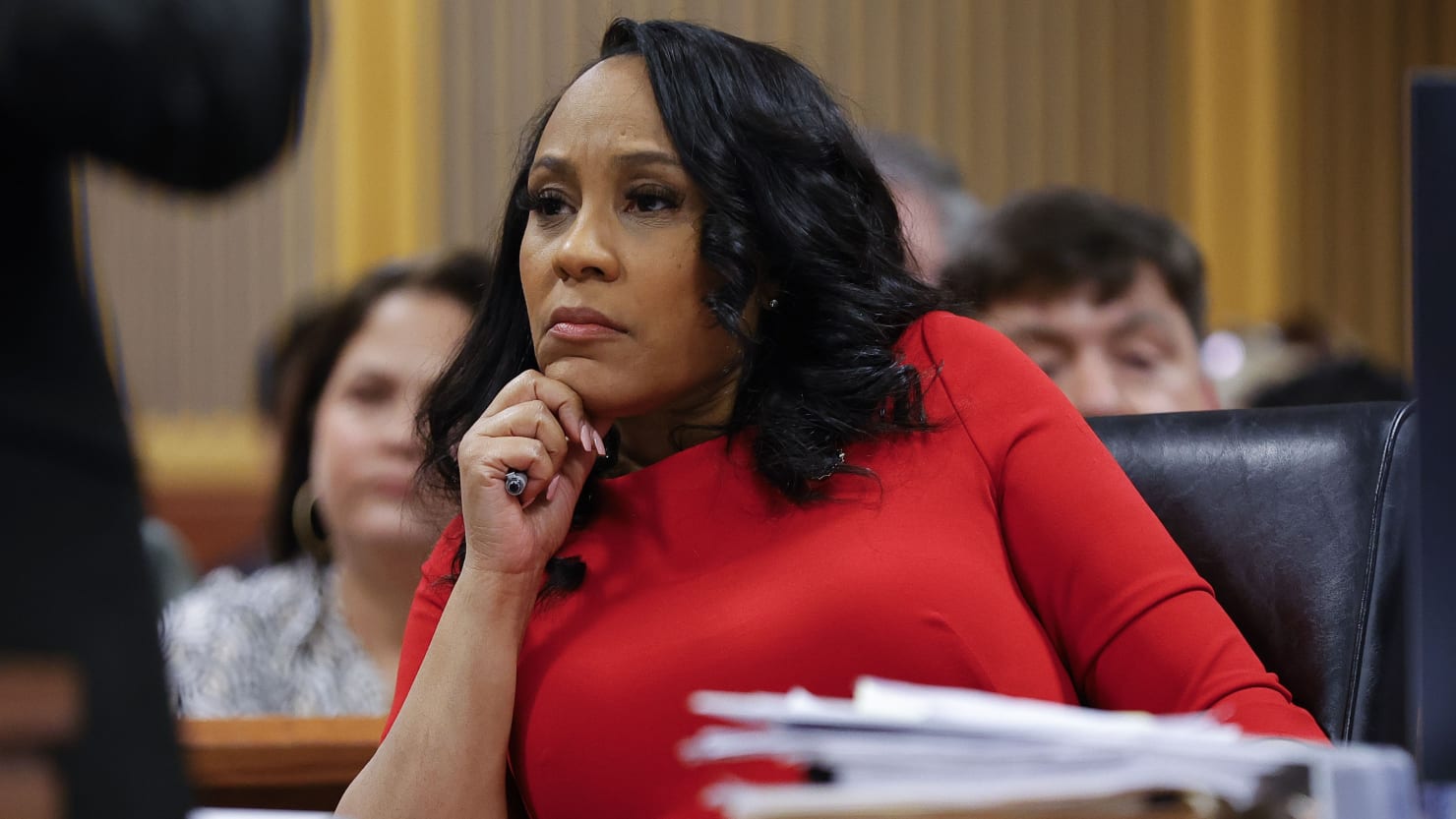A Georgia judge ruled Friday that Fulton County District Attorney Fani Willis should not be disqualified from the Trump election interference case—if the special prosecutor she had an affair with steps aside.
Judge Scott McAfee ruled that Willis’ romantic relationship with special prosecutor Nathan Wade brought a “significant appearance of impropriety that infects the current structure of the prosecution team,” which can only be resolved if one of them steps aside from the case.
“The District Attorney may choose to step aside, along with the whole of her office, and refer the prosecution to the Prosecuting Attorneys’ Council for reassignment,” he wrote in the 23-page ruling. “Alternatively, SADA Wade can withdraw, allowing the District Attorney, the Defendants, and the public to move forward without his presence or remuneration distracting from and potentially compromising the merits of this case.”
The decision comes after a defense motion to disqualify Willis and dismiss the racketeering indictment for former President Donald Trump and several of his co-defendants. In the motion, former Trump aide Mike Roman’s defense attorney argued that Willis financially benefited from hiring Nathan Wade as special prosecutor because the pair went on luxurious trips paid for by his taxpayer-funded salary.
McAfee rejected the motion’s request to disqualify Willis, stating that there’s no evidence of an “actual conflict of interest” brought on by the relationship, as defense lawyers failed to prove the DA “acquired a personal stake in the prosecution, or that her financial arrangements had any impact on the case.”
“This finding is by no means an indication that the Court condones this tremendous lapse in judgment or the unprofessional manner of the District Attorney’s testimony during the evidentiary hearing,” the judge wrote. “Rather, it is the undersigned’s opinion that Georgia law does not permit the finding of an actual conflict for simply making bad choices—even repeatedly—and it is the trial court’s duty to confine itself to the relevant issues and applicable law properly brought before it.”
The romantic entanglement, which defense attorneys argued began before Willis hired Wade in November 2021, allegedly resulted in misconduct, hindered a fair trial in the Georgia state election interference case, and made the DA’s office a “global laughing stock,” according to the defense team.
Wade and Willis confirmed on the stand that they had a romantic relationship but said it began in early 2022 and lasted until last summer. The two denied any wrongdoing and pushed back on claims that their affair was funded solely by Wade. Senior Assistant District Attorney Adam Abbate argued that despite “misleading” evidence, the defense team failed to prove that the “irrelevant” relationship between Wade and Willis impeded the case or cited relevant case law.
“You think I’m on trial? These people are on trial for trying to steal an election in 2020. I’m not on trial, no matter how hard you try to put me on trial,” Willis said in court last month, after asking to testify despite initial attempts from her office to keep her off the witness stand.
McAfee’s decision not to remove Willis—or her entire office—from prosecuting Trump and his allies may have saved the historic Georgia probe from derailment. Prosecutors allege in the state RICO case that Trump and his co-defendants conspired to change the 2020 Georgia election results.
While the case does not yet have a trial date, it is considered the strongest of several against Trump and is the only one that the former president cannot be spared from with a pardon. He and his co-defendants face a minimum of five years in prison.
On Wednesday, McAfee dismissed six charges against Trump and his co-defendants, three of them directly involving the former president. The judge, however, insisted that the ruling “does not mean the entire indictment is dismissed.”
Steve Sadow, who is representing Trump in the Georgia case, said in a statement to The Daily Beast that while his team respects McAfee’s decision, they still “believe that the Court did not afford appropriate significance to the prosecutorial misconduct of Willis and Wade.” He added that this team will “use all legal options available as we continue to fight to end this case, which should never have been brought in the first place.”
“This is a very unusual case, which caused for a very unusual remedy,” former DeKalb County District Attorney J. Tom Morgan told The Daily Beast. “But it’s like we’ve said all along, there was no actual conflict here. There was an appearance of it, however, and the judge ruled that the appearance if sufficient enough.”
Although Willis was not taken off of the case, defense attorneys sought to taint her credibility in the court of public opinion to further delay the racketeering case. During the string of hearings leading up to McAfee’s decision, only one witness directly contradicted Wade and Willis’ assertion that they started dating after the DA’s office hired the special prosecutor in the racketeering case.
Robin Yeartie, a former longtime friend of Willis who briefly worked at the district attorney’s office, testified that the pair started dating in 2019 after the two met at a conference. She said that she saw the pair “hugging, kissing, being affectionate” before Wade joined the DA’s office and last saw the couple in 2022. (Yeartie and Willis are no longer friends after a 2022 “situation” at the DA’s office where she was asked to resign or be fired.)
Wade’s former law partner and one-time divorce lawyer, Terrence Bradley, was also set to prove the relationship started earlier but insisted on the stand he couldn’t recall the timeline. Abbate later suggested that Bradley may have lied to Roman’s defense attorney, who relied on his information to file the January motion to disqualify Willis from the case.
Cellphone records presented by the defense also argued that Wade secretly made late-night trips to Willis’ house before the end of 2021. Prosecutors argued that evidence was not “properly peer-reviewed” and did not establish that Wade’s number was in touch with Willis’ number at those times.
“It’s highly offensive when someone lies on you, and it’s highly offensive when they try to implicate that you slept with somebody the first day you met with them,” Willis said on the stand to Roman’s lawyer about the allegations her relationship with Wade began as early as 2019. “And I take exception to it.”
The rebuke was one of several confrontations between Willis and defense attorneys while she was on the stand. Willis also critiqued the “highly offensive” court filings in the case, asked a defense attorney not to yell at her, and called out attempts to try to trip her up.
She also disclosed details about her personal life, including how she prefers Grey Goose vodka over wine, has no interest in visiting Australia, and was taught at an early age by her father to always have cash on hand.
“I’m not trying to be racist, but it’s a Black thing,” Willis’ father, John Floyd, testified last month about his cash stance.
“I was trained, and most Black folks, they hide cash or they keep cash, and I was trained you always keep some cash,” he added. “I gave my daughter her first cash box.”
Willis testified that she used that cash to pay Wade back for their vacations whenever he put things on his credit cards. Wade also confirmed that Willis would “pay her own way” by giving him cash or paying for things on their trips, which included a 2023 trip to Napa and a cruise.
“Let’s take the Belize trip, for example. That was a birthday trip to me, so I paid nothing for that trip,” Wade said about the March 2023 trip. “We are not keeping a ledger.”
Wade and Willis confirmed that, while they are no longer romantically involved, they believe they still have a close relationship. “We will be friends to the day we die,” Willis said.
Ted Goodman, a political adviser to Mayor Rudy Giuliani, said Friday that it “defies logic” that Willis or Wade remain on the case after the evidence shown during the evidentiary hearing. “This whole show-trial should concern every American,” Goodman added. “It’s a sad day in America. We are showing the world that the United States no longer has a fair system of justice.”
McAfee ruled Friday that the evidentiary hearing established “the prosecution is encumbered by an appearance of impropriety” and that even if the relationship started after Wade was hired, Willis still chose to supervise and pay him during the affair.
“Wade’s patently unpersuasive explanation for the inaccurate interrogatories he submitted in his pending divorce indicates a willingness on his part to wrongly conceal his relationship with the District Attorney,” McAfee wrote. “As the case moves forward, reasonable members of the public could easily be left to wonder whether the financial exchanges have continued resulting in some form of benefit to the District Attorney, or even whether the romantic relationship has resumed.”
“As long as Wade remains on the case, this unnecessary perception will persist.”


